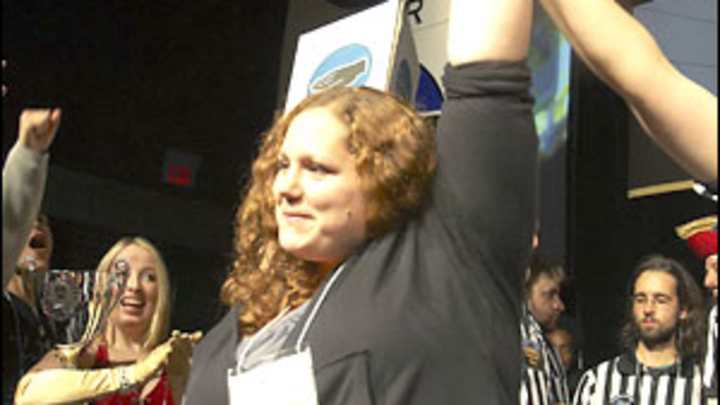American hero

Farina, a fifth-year senior studying communications design at Syracuse University, walked away from the Steamwhistle Brewery as World Champion, with $7,000 in prize money and the honor of being the first woman and first American to win the title since the championships began in 2002.
Three years ago, Farina had never heard of the World RPS Society or the RPS championship. But, when her SU roommate, who had attended the event with folks from the campus TV station, told her what a blast it had been, Farina was intrigued.
"I was like, I can't believe they have a championship, and it's a championship I could compete in," Farina said. "I was like, 'why not?' it's something fun to do."
Farina and her friend Michael Halper decided to attend and compete the following year (anyone can enter), and a tradition was born. Whenever the two hung out prior to that first trip, they would train by playing against each other. Though Halper graduated last spring and is now living and working in Chicago, he had no intention of letting that tradition die. He bought plane and competition tickets for himself and Farina this year and jokingly told her the two better not have a falling out before the competition, because the tickets were non-refundable.
"It meant a lot to me that he would come out for this," Farina said. "I wouldn't have gone without him. It's been something we've done together for a long time. It meant a lot that he cared enough to do this. "We said one of us is going to win, this is our year to win, but we didn't actually mean it."
The pair thought it more likely one of the people who live and breathe RPS -- the people who consider RPS a real sport that requires real training, or the people who think wearing a costume to the competition is an appropriate way to represent their intensity -- would take the title and the money.
"There are people who are really into it," Farina said. "But it's just fun. It's fun to make something competitive out of something that's just, in the end, RPS. You can't take yourself too seriously."
This time around, with Halper in Chicago, Farina's competition prep mostly came from friends. After telling people she planned to compete in the RPS Championships, Farina could usually count on a challenge. She could also usually count on a win.
"I once had a friend who was completely convinced he could win, and I beat him like 30 times in a row," Farina said.
Though she competes because doing so is fun, Farina admits she's a competitive person. She turned to strategy to surpass the approximately 400 other entrants, including her final-round opponent David Arnold. Farina kept certain facts in mind (rock is the most common first throw, for example) but also tried to get inside her opponents' heads and figure out their moves by keeping track of what they played in the past.
Another strategy was to avoid the Street RPS games going on all around Steamwhistle Brewery, where competitors played each other and bet fake money (with some actual cash going to the ultimate winner) during their down time.
"I decided I wasn't going to play that, because you get into the frame of mind of losing or something and you get psyched out," Farina said.
In the end, thinking of the event as the bizarre, fun tradition it had become is what helped Farina to the win. She lost the first game to Arnold, but calmed herself down by remembering she was one step away from $7,000, and ultimately won by throwing paper to Arnold's rock.
"A lot of people said it's very symbolic that the woman beat the man throwing paper, while he threw rock," Farina said. "My only answer to that is: he was throwing rock a lot."
Though she brushed off the gender-war talk, Farina felt proud to be the first woman and first American to win. There's bound to be another, but she will always be the first. She also relished her prize money, which she plans to use on a new computer and printer and to build her portfolio.
In addition to a larger bank balance, Farina is also dealing with another addition to her life: media attention. She's had dozens of interview requests since her win, including numerous appearances on radio shows (both within and outside of the U.S.). Though many radio hosts have challenged Farina to on-air, over-the-phone RPS duels, only SIOC has challenged her in person since she became champion (despite a lot of trash talking and unwarranted confidence, SIOC fell after four attempts: S-S, S-P, R-R, S-P). Farina said she finds it odd that people want to talk to her about something any person could achieve, but that she is still granting as many interviews as possible to appease her family.
"The family thinks it's so much fun," said Farina's mother, Marion. "Every time someone finds something, we send it to each other. I got an e-mail from my sister saying her son [age 15] was so excited because he saw Andrea interviewed on a gaming network."
Farina's family was not the only one excited and amazed.
"I kept thinking 'I can't believe this is happening,'" Halper said. "She just kept winning. The whole way home we just laughed about how crazy it was that she actually won.
Though both Farina and Halper will be college graduates when it's time for next year's championships, the two plan to keep attending.
"It's become a tradition," Halper said.
Plus, Farina feels compelled to defend her title. And when she does, her goal will be the same: not to win, but to have fun.
"It's RPS," Farina said. "If I can't have fun doing this, I can't have fun doing anything, and that's really sad."
